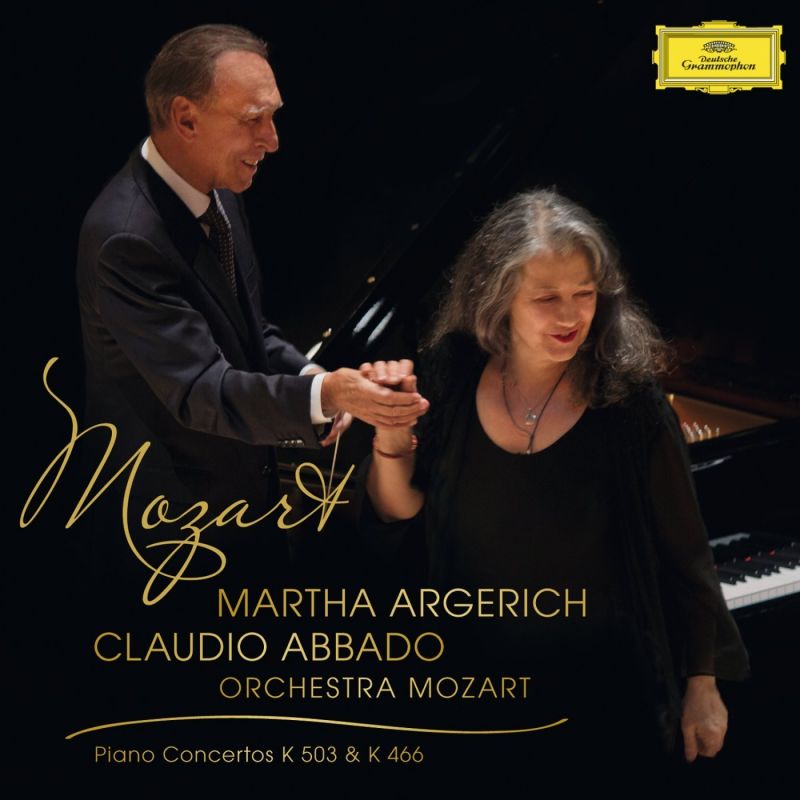MOZART Piano Concertos Nos 20 & 25
View record and artist detailsRecord and Artist Details
Composer or Director: Wolfgang Amadeus Mozart
Genre:
Orchestral
Label: Deutsche Grammophon
Magazine Review Date: 03/2014
Media Format: CD or Download
Media Runtime: 61
Mastering:
DDD
Catalogue Number: 479 1033GH

Tracks:
| Composition | Artist Credit |
|---|---|
| Concerto for Piano and Orchestra No. 20 |
Wolfgang Amadeus Mozart, Composer
Claudio Abbado, Conductor Martha Argerich, Piano Mozart Orchestra Wolfgang Amadeus Mozart, Composer |
| Concerto for Piano and Orchestra No. 25 |
Wolfgang Amadeus Mozart, Composer
Claudio Abbado, Conductor Martha Argerich, Piano Mozart Orchestra Wolfgang Amadeus Mozart, Composer |
Author:
Both Argerich and Abbado have returned to Mozart late in their careers: she revisiting the piano duets and a handful of concertos; he forming the hand-picked and youthful Orchestra Mozart specifically for the purpose. Not uncharacteristically for her, the present concertos are both works she has recorded before – the D minor in 1998 (Teldec/Elatus, 6/99), the C major in 1978 (EMI, 4/00) and again as recently as 2012, during that year’s Progetto Martha Argerich at Lugano (EMI, 8/13). Of that last recording, Caroline Gill wrote that it was ‘musically and technically equal to anything she has recorded in the studio’; but here again she surpasses herself. The backing of the exquisitely refined Orchestra Mozart grants full rein to her personal brand of expressivity. Every note matters, both individually and as part of a phrase, and once again her microscopic alterations of touch make even the most mundane run of semiquavers dance and sing, imparting something undefinable and treasurable to her performances here.
The C major comes first on the disc, the grandeur of Abbado’s introduction contrasting with the spirited filigree of Argerich’s solo contribution. She is fully alive to the darker undertow of the D minor, perhaps the only disappointment being Abbado’s refusal fully to acknowledge the way the work’s Sturm und Drang demeanour is undercut by the whiff of Singspiel at the work’s close, the sound world of Don Giovanni giving way to that of Papageno and The Magic Flute. Argerich sets off with a will in the finale but doesn’t let herself get carried away in the Romanze’s central convulsion, sticking firmly to the tempo of the gentler outer sections. Where she does let go the full power of her virtuosity is in the cadenzas: her teacher Friedrich Gulda’s in K503, the familiar Beethoven in K466. Familiar, perhaps, but rendered almost hallucinogenic when refracted through the prism of her unique musical imagination.
Argerich might have been expected to choose these two particular concertos: the one grand, the other demonic. Lars Vogt chooses two that are altogether more playful in their different ways: an earlier C major work, K467, and the last of Mozart’s piano concertos, the B flat, K595. (One wonders what Argerich might one day make of one of these less demonstrative concertos.) The former, its slow movement especially, has become, in the words of a recent study, a ‘synecdoche for Mozart, and perhaps for classical music tout court’, thanks to its use in a film almost half a century ago. And there it is, emblazoned on the digipack’s back cover: Elvira Madigan. Now is perhaps not the time to analyse the way that a long-forgotten Scandinavian film continues to define our present relationship with Mozart; better to remark on Vogt’s innate thoughtfulness and sensitivity as a Mozartian. No surprise there, of course; and Paavo Järvi and his Frankfurt broadcasting band prove a perfect fit, especially in K595, where a slightly lighter bass contributes to an ideal balance. As for that K467 slow movement, it is dispatched near-perfectly: while it is all too easy to linger a little lovingly on something so outwardly beautiful, Vogt and Järvi offer sentiment without sentimentality, allowing those subversive inner parts to make their full effect.
The late B flat work also appears on Martin Helmchen’s second Mozart concerto disc for Pentatone. If the Netherlands Chamber Orchestra under Gordan Nikolitch are not quite as refined as Järvi’s Frankfurt RSO, Helmchen and Vogt are equally responsive to what some see as the work’s ‘autumnal’ aspect. And for those who would question that adjective ‘playful’ when applied to this late work, it’s only a minute in before the violins are chuckling away at the second subject. Helmchen’s coupling is an earlier concerto in the same key, K450 – a work replete with all of Mozart’s hallmarks but not quite yet with that magical synthesis of indelible melody, effortless virtuosity and emotional breadth.
Argerich with Abbado, then, is a surefire winner and a suitable memorial to the late conductor. Vogt’s coupling, too, is compelling; while Helmchen’s unfolding Mozartian journey is doubtless one to follow.
Discover the world's largest classical music catalogue with Presto Music.

Gramophone Digital Club
- Digital Edition
- Digital Archive
- Reviews Database
- Full website access
From £8.75 / month
Subscribe
Gramophone Full Club
- Print Edition
- Digital Edition
- Digital Archive
- Reviews Database
- Full website access
From £11.00 / month
Subscribe
If you are a library, university or other organisation that would be interested in an institutional subscription to Gramophone please click here for further information.




